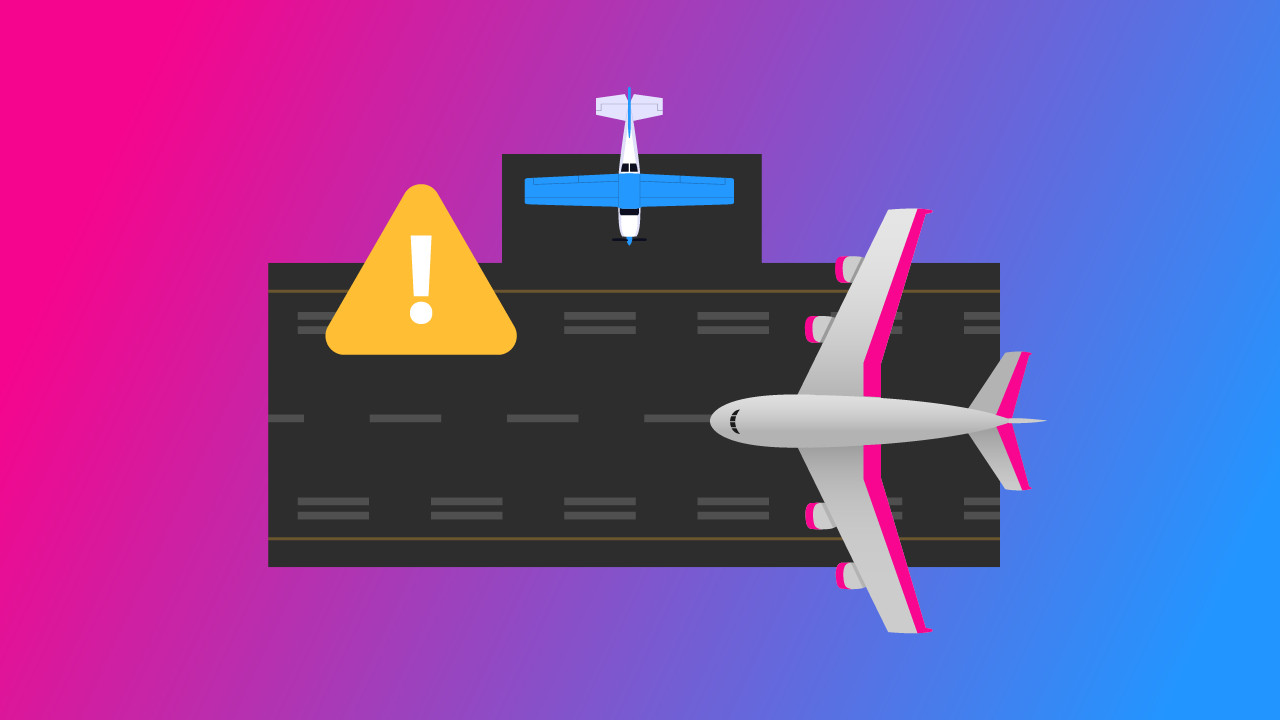-
Key Takeaways
-
Understanding Flight and Exam Anxiety
- Trust Your Training
-
Reducing Anxiety With Practice
- Solo Flight Preparation Tips
- Written Test Preparation Tips
-
Techniques to Calm Pre-Solo and Exam Nerves
- Relaxing Techniques Before Your Solo
- Relaxing Techniques Before Your Exam
-
Staying Calm Under Pressure
- Dealing With Pre-Solo Pressure
- Dealing With Written Exam Pressure
-
What Happens if You Fail?
- After a Written Exam Setback
- After a Solo-Flight Setback
- Does a Failed Exam Affect Your Career?
-
Conclusion
It’s natural to feel anxious about flying alone in the cockpit for the first time. Just like a mother bird lets go of her young, a student pilot must take that leap of faith into solo flight.
But, this can be easier said than done. There is a lot of pressure riding on passing exams and being prepared to fly solo.
That’s why we have compiled techniques and tips in this article to help you keep your cool. The excitement of successfully completing your first solo flight is unmatched. And with the right mindset, you will pass and achieve your dreams.
Let’s begin!
Key Takeaways
- Flight and exam anxiety stem from pressure to perform, fear of failure, and self-doubt.
- Being well-prepared is your best weapon in reducing anxiety.
- You can use breathing and visualization techniques to stay calm during a high-stakes milestone.
- Mistakes and failures are part of growing as a pilot, and what matters most is how you bounce back.
Understanding Flight and Exam Anxiety
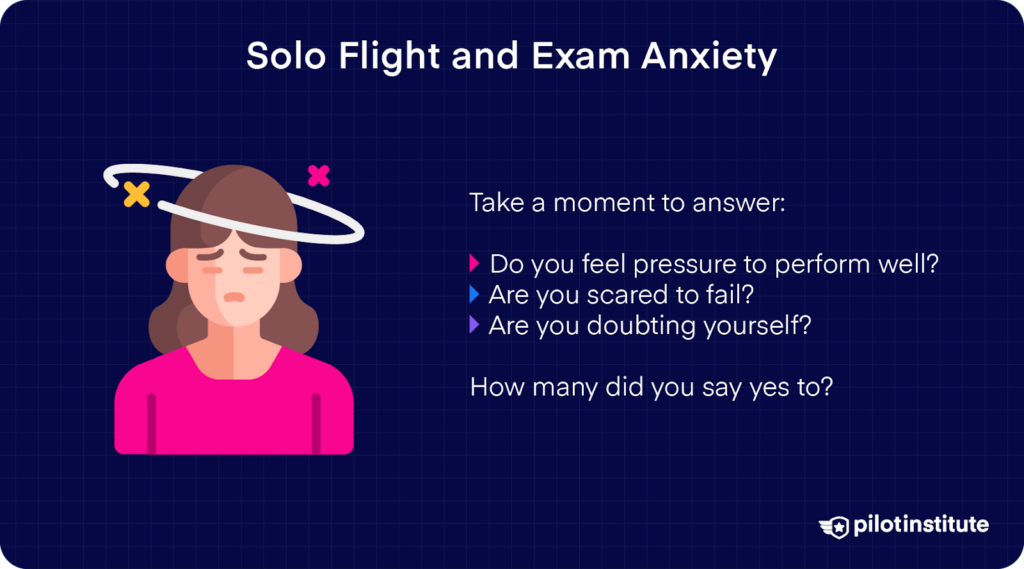
Seeing as you’re reading this article, you’ve already taken the first step: acknowledging how you feel. Congratulations! Acceptance takes a lot of courage, and many pilots never even get this far.
You may be feeling uneasy, but that can be a good thing. Sit with the feeling and welcome it. You’re on your way to becoming a confident pilot.
Are you wondering where your anxiety might be coming from? Let’s look at it a little closer.
There’s a lot of overlap between the anxiety you feel before flying solo and the kind of nerves you get before a big test.
Take a moment to answer these questions:
- Do you feel pressure to perform well? Taking an exam and going solo both involve a sense that everything depends on how well you do.
- Are you scared to fail? You might worry about messing up, not meeting expectations, or not being good enough.
- Are you doubting yourself? Just like before a test, you may second-guess whether you’re truly ready to handle the challenge.
How many questions did you say yes to?
Whether it’s one or all three, your feelings are completely valid. You may have started to overthink. Instead of trusting your abilities, you focus on potential mistakes.
Trust Your Training
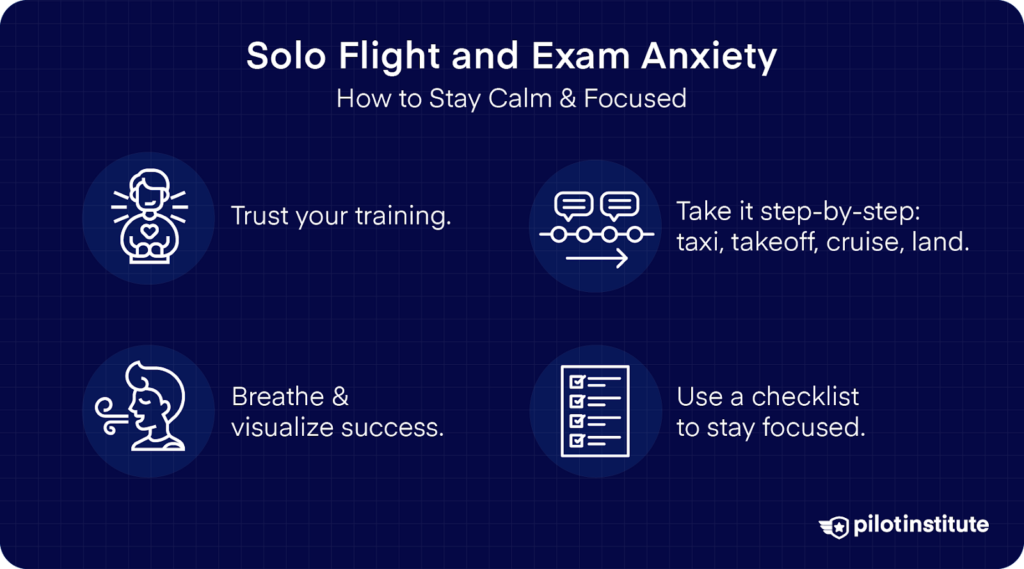
Building your self-confidence as a pilot is an endeavor that requires time and repetition. It’s best to take everything and break it down into simple steps to tackle one at a time.
Always remember that you’ve been expertly trained for this moment. Your instructor, who has thousands of hours on you, has sharpened their judgment of their students’ abilities.
They’ve been closely watching your progress and assessing you. Your instructor wouldn’t let you fly solo if they didn’t believe you were ready.
So, to the anxious pilot, here’s some valuable advice:
- Trust your training. You’ve practiced the same maneuvers over and over with your instructor. At this point, your skills and instincts are well-developed.
- Take it one step at a time. Don’t get overwhelmed by thinking of the entire flight. Break down your focus on each phase—taxiing, takeoff, cruising, and landing—as individual tasks.
- Breathe and visualize. Deep breathing helps calm your nerves. Visualizing a smooth, successful flight can boost your confidence before takeoff.
- Have a checklist. Rehearsing your pre-flight checks and procedures can keep you focused and calm.
The first solo or a big exam is a significant milestone, but it’s also just another part of your journey as a pilot. It may not turn out perfect, but it never really does for anyone.
They’re all about gaining experience and growing your confidence. Every pilot has gone through this, and you’ll feel more comfortable and in control each time you fly.
So embrace the challenge and trust your skills. Remember that you’ve got what it takes to handle whatever comes your way.
Reducing Anxiety With Practice
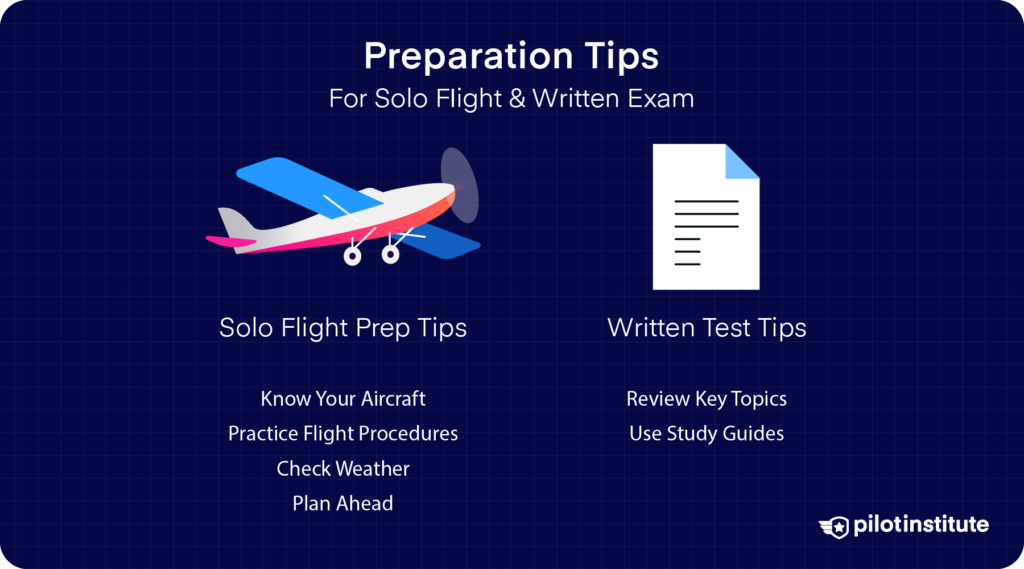
One of the biggest ways to reduce anxiety is through preparation. Knowing exactly what to expect and how to handle different scenarios reduces the stress of the unknown. The more you prepare, the better off you will be, and that in turn will lower your anxiety.
Keep in mind that it’s not just about knowing how to fly; it’s also about being mentally and physically ready for anything.
What does thorough preparation mean? It can be a lot of things, but here are some of the best ways you can be ready for your solo.
Solo Flight Preparation Tips
- Know your aircraft. Make sure you’re familiar with all the controls and instruments. Master the emergency procedures by heart. Speaking of procedures–
- Know the flight procedures. Rehearse your turns and landings until they become second nature. Yes, this includes stalls. If the worst happens, you’ll feel confident that you know what to do. Rehearse the entire procedure and have a friend come and assist you.
- Understand the weather conditions. To help you anticipate and adapt to different situations, make sure to check the weather reports. Take note of the METAR and TAF, and assess what conditions to expect on your flight.
- Do a pre-flight plan. Review the route, airspace, and alternate landing options. Brush up on your radio communication. Practice what you expect to hear and transmit. The more you plan, the more relaxed you’ll feel.
Written Test Preparation Tips
When it comes to your written test, preparation is just as important.
These techniques are helpful in both exams and your first solo, so there’s a lot to gain from practicing them:
- Review key topics. Go over the major subjects like navigation, aerodynamics, and regulations.
- Use study guides and materials. These tools help you focus on the most relevant information, making your study sessions more productive.
Practicing flight maneuvers and test questions is one of the best ways to beat anxiety. By practicing, you turn uncertainty into familiarity. You won’t just be hoping for things to go well—you’re prepared for it.
For something more hands-on, flight simulators let you rehearse various flight scenarios. These include emergency situations in a safe, low-stakes environment.
Are you worried about tricky questions in the exam? Doing sample questions helps you get used to the format and content of the test.
Mock exams simulate the pressure of a real test. You get a feel for the timing and types of questions you’ll face, helping you go into the exam with confidence.
Techniques to Calm Pre-Solo and Exam Nerves
Still having trouble relaxing? Going through a high-stakes milestone can make anyone break out in a cold sweat, even for most pilots.
Let’s look at some powerful ways to manage these nerves. Each technique targets specific aspects of stress.
Relaxing Techniques Before Your Solo
Give these exercises a shot:
- Box breathing: Inhale for four seconds, hold for four, exhale for four, and pause for another four. This slows your heart rate and creates a rhythm that promotes calmness.
- Progressive muscle relaxation: Tighten and relax muscles one by one, starting from your toes and working upward. Tension may build up without you noticing, and this technique will reduce that.
- Mindful observation: Pay attention to small details in your environment. Notice the texture of the controls, the hum of the engine, or the sound of your breath. These sensory details anchor you to the moment, preventing your mind from drifting into worry.
Visualization also prepares your mind to handle tough situations with confidence and ease.
Have you ever heard of manifesting? It’s a debatable subject, but it does wonders for calming your nerves.
Imagine each stage of your flight in detail, from taxiing to landing. Picture a smooth and controlled process. This mental rehearsal lets your brain experience success as if it’s already happened.
Relaxing Techniques Before Your Exam
For exams, visualize yourself sitting calmly, answering questions with focus. Let yourself feel the positive emotions that come with confidently crushing each question.
Here’s the really powerful part: replay challenging moments in your mind. Imagine making a difficult turn or managing a tricky test question, and picture yourself handling them skillfully. This gives your mind a pattern to follow.
When you’re in the middle of your big moment and feel anxiety creeping up, relaxation techniques will be your best weapon. They can improve concentration and reduce stress in real-time.
Try these out:
- Breath-focused checks: Take a slow, intentional breath before each task in your checklist. Once you feel the nerves start to dissipate, carry on with the procedures.
- Hand and arm relaxation: Loosen any tight grip on the controls or pen to ease physical tension. Stretch your palms, and relax your shoulders.
- Soft focus: Instead of fixating on one thing, like an instrument or a question, allow your vision to soften. If you catch yourself getting tunnel vision, expand your focus and look at everything around you as a whole.
Staying Calm Under Pressure
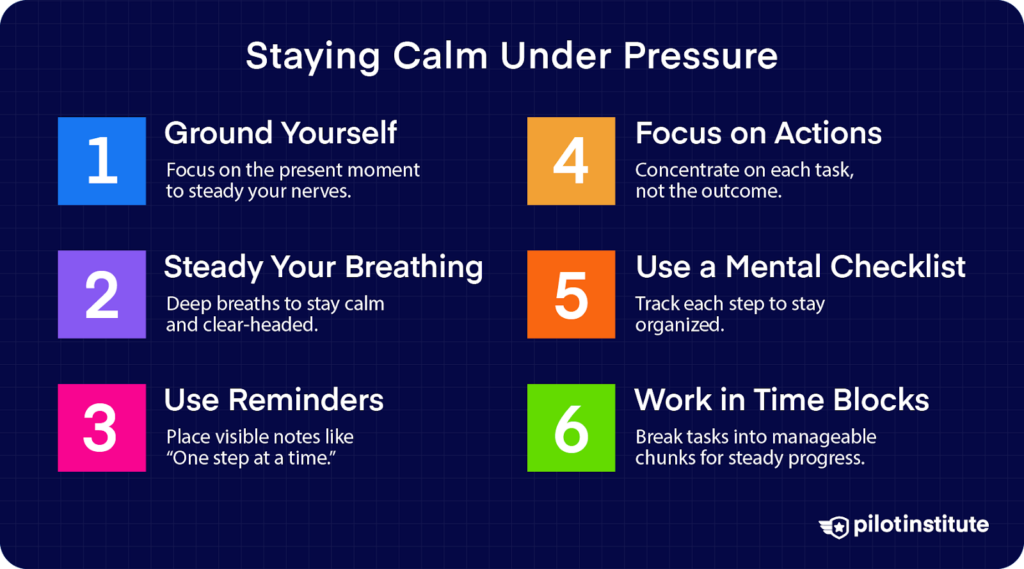
Being a pilot is a high-pressure job, so it’s necessary to stay calm under pressure. And you don’t have to be scared. You can develop this skill with practice.
Dealing With Pre-Solo Pressure
When you’re in the heat of it all, start by grounding yourself in the present moment. In the cockpit or exam room, steady your breathing and keep your focus on the task at hand.
How can you help yourself stay focused? Here are some techniques you can use:
- Write visible reminders. Before takeoff, place simple reminders and encouragements somewhere visible, like “Stay focused” or “One step at a time.”
- Focus on actions over outcomes. Concentrate on each action rather than the result, like making a smooth turn or answering each part of a question correctly.
If you make an error during the flight, acknowledge it, make the correction, and move on. Fixating on mistakes can break your focus and worse, affect your overall performance.
Dealing With Written Exam Pressure
In an exam, skip any question you’re unsure of and come back later. Treat each question as a fresh opportunity rather than thinking about any previous struggles.
Do you easily get rattled by time pressure?
While this advice may seem obvious, effective time management is still the best way to stay calm. We’ve got some concrete solutions for you to beat the pressure:
- Use a mental checklist. Before flying or testing, map out how you’ll allocate your time and focus on high-priority tasks. In the cockpit, use a mental checklist to track each step, keeping things orderly and ensuring you’re not rushing through any phase. This might include double-checking your altitude, heading, and airspeed.
- Work in blocks of time. Scan the entire test and mentally divide your time across questions, giving you a sense of control from the start. Divide your flight or exam into chunks, focusing fully on each stage. This pacing prevents you from feeling hurried and helps you make steady progress.
What Happens if You Fail?
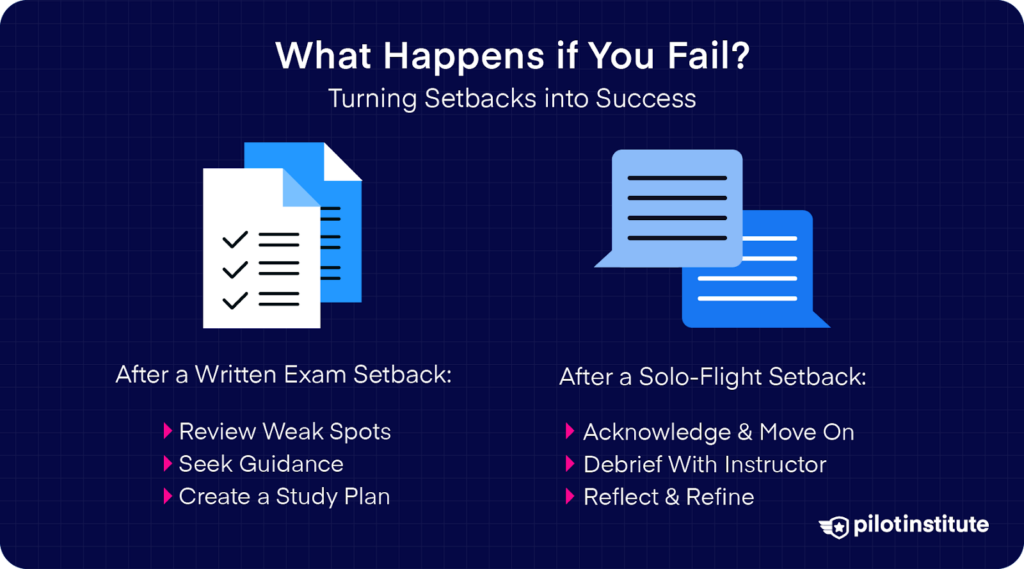
Failures may feel like setbacks, but you should remember that they are part of the learning process and not a final judgment of your abilities.
After a Written Exam Setback
Don’t panic if you don’t pass the written test. You’ll always have a chance to retake it, and many pilots who fail on their first try go on to pass with flying colors.
The silver lining here? Failure allows you to build discipline and further sharpen your knowledge.
Take advantage of this opportunity and come back stronger with this approach:
- Review your weak spots. Go over the questions you missed and spend time studying those topics. This extra focus can turn a setback into solid preparation.
- Seek guidance. Talk to your instructor or fellow students. Colleagues and mentors have plenty of valuable insight and can suggest new strategies for approaching tough areas.
- Create a study plan. Organize a focused strategy that includes the areas you need to strengthen. Clear up time in your schedule to study, and tackle at least one subject a day.
After a Solo-Flight Setback
If you make a mistake during your solo flight, don’t let it shake you. The main objective of your solo is for it to be a learning experience.
Here are some of the best ways to process any rough spots:
- Acknowledge the mistake and move on. Take a moment to recognize what happened, but don’t dwell on it. Shift your focus to the next task and stay grounded.
- Debrief with your instructor. After landing, discuss the flight openly with your instructor. We can’t emphasize enough the importance of transparency. Your instructor is there to help you. They want you to understand what went wrong and how to handle similar situations in the future.
- Reflect and refine. You know yourself the best. Sit down and talk to yourself about what went wrong. Then, take practical steps to avoid making the same error.
Resilience means having the ability to bounce back and stay positive. Believing in yourself is a skill that you can only master with experience.
You can always take a break if you’re feeling frustrated and burnt out. Once you’re ready to try again, you’ll have the perspective and energy for a fresh start.
Does a Failed Exam Affect Your Career?
Are you worried about how failure can impact your career?
Well, we can assure you that your future employment chances are still intact.
You can absolutely retake the test, and many pilots, even those flying for major airlines today, didn’t even pass on their first try!
Employers in aviation understand that learning to fly is a demanding process. They look at your final results, skills, and experience, not just the hurdles you faced along the way.
Failed exams don’t appear on your pilot’s certificate, and they typically aren’t reviewed as part of the hiring process for airlines or other aviation employers.
What matters most is that you persisted, improved, and succeeded in meeting their standards.
Conclusion
Feeling anxious is totally normal when you’re about to take your first solo flight or private pilot written exam. But don’t let those nerves stop you from reaching your goals! Be prepared and keep a positive mindset; then you can turn that anxiety into confidence.
Practice your flight moves, study regularly, use online training resources, and try out relaxation techniques. Remember, every step towards becoming a skilled pilot is worth celebrating.
Don’t be afraid to pursue your dreams! Trust in your training, lean on the support of your mentors, and believe that with persistence, you will succeed.


